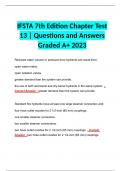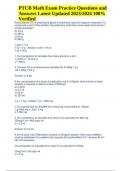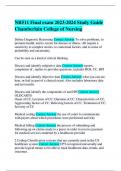Reduction and Oxidation Titrations
Manganate (Vii) Titrations
Potassium manganate has a deep purple colour and is reduced to colourless manganate (ii)
ions. Potassium is a spectator ion. The appearance of a colour change and marks the end point.
The colour should be pink. If it is purple the end point has been overshot. The colour change
occurs without a indicator therefore it is self indicating.
MnO4 - + 8H+ + 5e- ---> Mn2+ + 4H2O
Fe2+ ---> Fe3+ + e-
5Fe2+ + MnO4- + 8H+ ---> 5Fe3+ + Mn2++ 4H2O
Initially the reaction is very slow but as it progresses the reaction produces its own catalyst
Mn2+ (autocatalysis) which increases the rate of reaction.
The experiment must be done in acidic conditions therefore dilute sulphuric acid is used.
HCl cannot be used as the MnO4- would oxidise the Cl- to Cl2 so would affect the volume
of KMnO4 needed in the titration.
Concentrated sulphuric acid or concentrated nitric acid are oxidising agents so cannot be
used as they would also affect the volume of KMnO4 required for the titration.
Ethanoic acid cannot be used as it is a weak acid and would not provide enough H+ ions.
Dichromate (Vi) Titrations
K2Cr2O7 is another oxidising agent where its oxidisation state changes from +6 to +3. The
reaction needs hydrogen ions which must be acidified with dilute sulphuric acid.
Cr2O7- + 14H+ + 6e- ---> 2Cr3+ + 7H2O
5e- + 8H++ MnO4- ---> Mn2+ + 4H2O
The colour change is difficult to see as the dichromate ion is a pale orange and chromium (iii) is
a pale green.
Fe3+ can be reacted with Zn to reduce it back to Fe2+ for analysis.
Analysis of C2O42-
5C2O42- + 2MnO4- + 16H+ ---> 10CO2 + 2Mn2+ + 8H2O
C2O42- ---> 2CO2 + 2e-
5C2O42- + 2MnO4- + 16H+ ---> 10CO2 + 2Mn2+ + 8H20
Both ions are negative therefore repel each other which causes the reaction to be slow and
needs to be warmed at the start of the reaction to overcome the forces of attraction. This
reaction is also autocatalysis.
Manganate (Vii) Titrations
Potassium manganate has a deep purple colour and is reduced to colourless manganate (ii)
ions. Potassium is a spectator ion. The appearance of a colour change and marks the end point.
The colour should be pink. If it is purple the end point has been overshot. The colour change
occurs without a indicator therefore it is self indicating.
MnO4 - + 8H+ + 5e- ---> Mn2+ + 4H2O
Fe2+ ---> Fe3+ + e-
5Fe2+ + MnO4- + 8H+ ---> 5Fe3+ + Mn2++ 4H2O
Initially the reaction is very slow but as it progresses the reaction produces its own catalyst
Mn2+ (autocatalysis) which increases the rate of reaction.
The experiment must be done in acidic conditions therefore dilute sulphuric acid is used.
HCl cannot be used as the MnO4- would oxidise the Cl- to Cl2 so would affect the volume
of KMnO4 needed in the titration.
Concentrated sulphuric acid or concentrated nitric acid are oxidising agents so cannot be
used as they would also affect the volume of KMnO4 required for the titration.
Ethanoic acid cannot be used as it is a weak acid and would not provide enough H+ ions.
Dichromate (Vi) Titrations
K2Cr2O7 is another oxidising agent where its oxidisation state changes from +6 to +3. The
reaction needs hydrogen ions which must be acidified with dilute sulphuric acid.
Cr2O7- + 14H+ + 6e- ---> 2Cr3+ + 7H2O
5e- + 8H++ MnO4- ---> Mn2+ + 4H2O
The colour change is difficult to see as the dichromate ion is a pale orange and chromium (iii) is
a pale green.
Fe3+ can be reacted with Zn to reduce it back to Fe2+ for analysis.
Analysis of C2O42-
5C2O42- + 2MnO4- + 16H+ ---> 10CO2 + 2Mn2+ + 8H2O
C2O42- ---> 2CO2 + 2e-
5C2O42- + 2MnO4- + 16H+ ---> 10CO2 + 2Mn2+ + 8H20
Both ions are negative therefore repel each other which causes the reaction to be slow and
needs to be warmed at the start of the reaction to overcome the forces of attraction. This
reaction is also autocatalysis.










